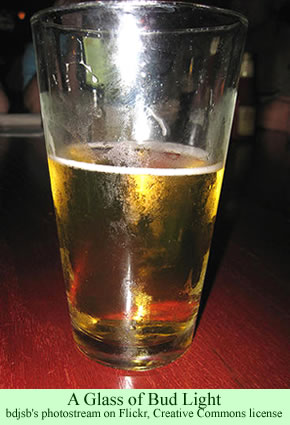While several peaceful societies, such as the Paliyans, Ifaluk, and Tristan Islanders, avoid alcoholic beverages because of the potential for violence, the ancient Nubians reportedly loved to brew and drink beer. A news story last week reported the work of scientists from Emory University who have found strong evidence that, not only did the Nubians figure out how to brew beer, but their beverage of choice had enough antibiotic properties for it to also served as a medicine.
George Armelagos, an anthropologist at Emory, discovered that the bones of ancient Nubians, examined under a fluorescent microscope, showed evidence of tetracycline labeling. Some scholars dismissed the significance of the evidence, but Armelagos took the research farther. He used high pressure liquid chromatography mass-spectrometric measurements to more closely examine the bones. He found that the ancient Nubians were consuming foods compromised of fermented grains—beer—and ingesting the tetracycline through it.
He hypothesizes that the Nubians discovered, accidentally, while making a batch of wine, that Streptomyces bacteria in the soil had contaminating their beverage. The resulting gruel had turned a golden color. Gold was good so they consumed it and continued to do so. They soon discovered that drinking the beverage would help them fight their illnesses. They began producing the antibiotic beer regularly, thus lacing their bones with the tetracycline. As a result, their bones still produce yellowish-green spots under a florescent light.
 As any good scientist would do, Armelagos made his own brew employing the techniques he deduced were used by the ancient Nubians. Then, of course, he fed it to his graduate students. They said it tasted like sour porridge. It was not a Bud Light, according to the news report. The professor, whose specialty is the study of ancient diets and foods, suspects that the Nubians would have normally drained off the fluid portions of their gruel to drink, then eaten the solids separately. After a few generations, however, the use of the antibiotic beer evidently waned and was soon forgotten.
As any good scientist would do, Armelagos made his own brew employing the techniques he deduced were used by the ancient Nubians. Then, of course, he fed it to his graduate students. They said it tasted like sour porridge. It was not a Bud Light, according to the news report. The professor, whose specialty is the study of ancient diets and foods, suspects that the Nubians would have normally drained off the fluid portions of their gruel to drink, then eaten the solids separately. After a few generations, however, the use of the antibiotic beer evidently waned and was soon forgotten.
Despite all the literature about various peaceful societies avoiding alcoholic beverages, the Fipa people, another nonviolent African society described by Roy Willis (1989b), apparently love to drink beer. It is an important aspect of their socializing. When men and women, participating as equals, pass bowls of beer around a room, they demonstrate that they can share the beverage without any displays of greed or selfishness. The beer drinking reinforces their peacefulness. Professor Armelagos may find it difficult to take his research on the beer drinking habits of the ancient Nubians quite that far.